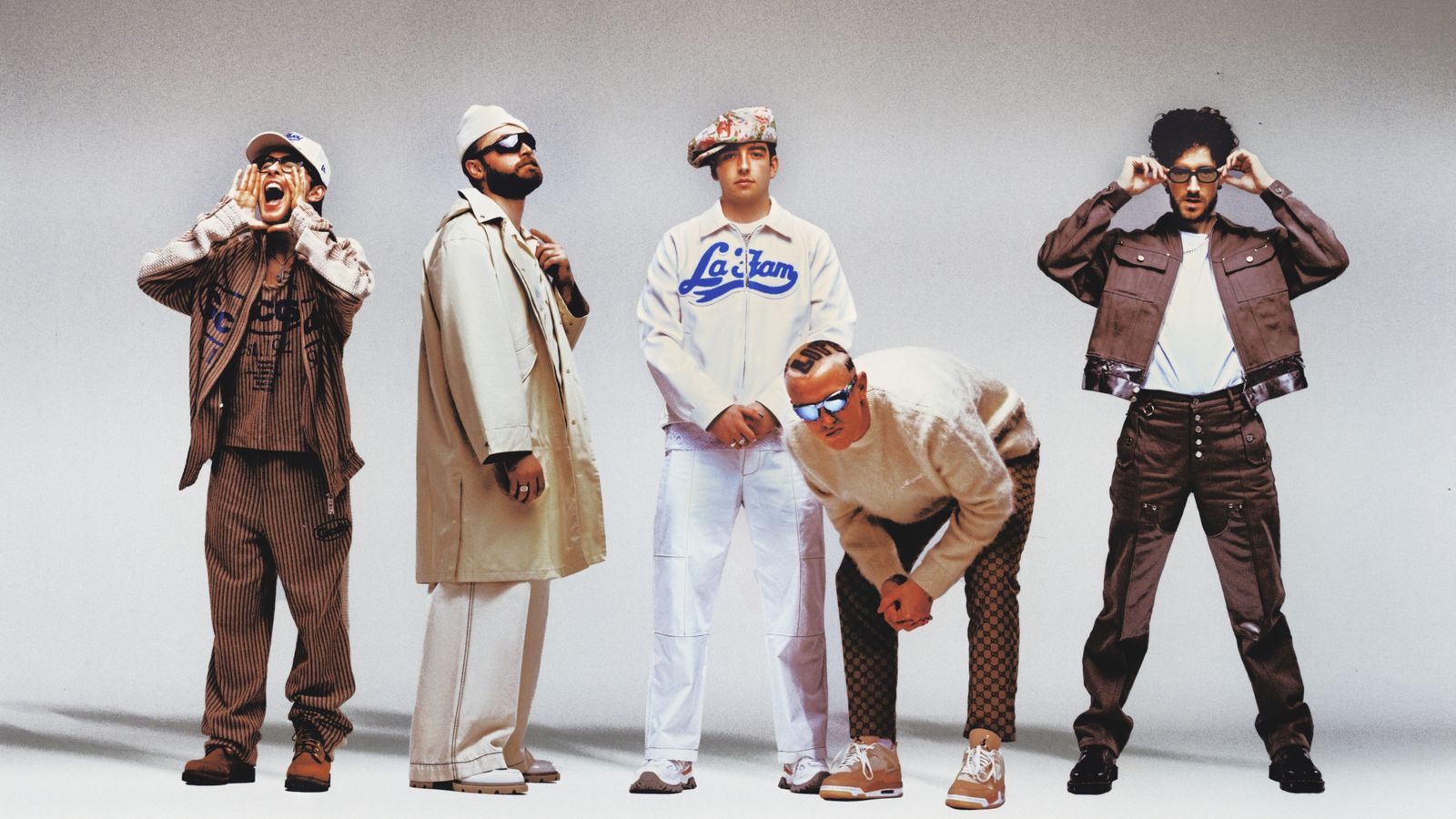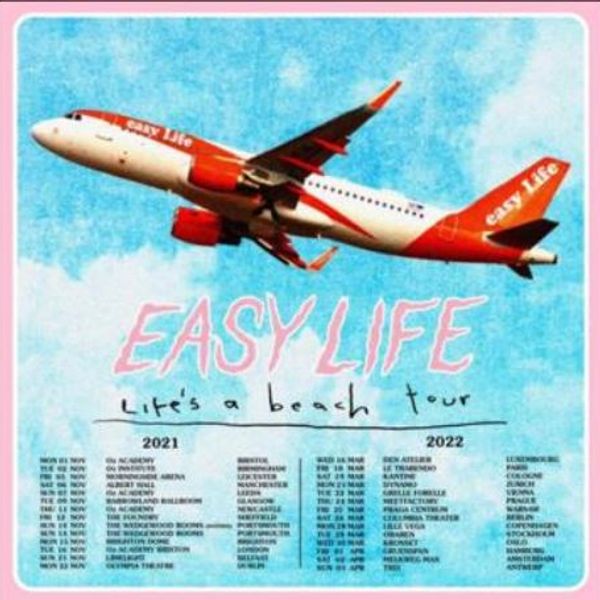“Thanks so much for celebrating our story with us,” was the message from Easy Life, after playing their final gigs under that name. “See you later, maybe never.”
For the band and their thousands of fans, hopefully there will be another chapter.
The two gigs, hastily organised for London and their hometown of Leicester, came less than two weeks after they announced they were being sued by easyGroup, holding company for easyJet and other “easy” brands, over their name.
While it seemed “hilarious” to the band at first, they quickly realised this was no joke. In easyGroup’s lawsuit it was pointed out they had used an image of an orange and white plane, similar to the branding for easyJet, for their Life’s A Beach tour, among other accusations about reputational damage. In a statement, EasyGroup founder and chairman Sir Stelios Haji-Ioannou labelled them “brand thieves”.
The band’s supporters – including fellow musicians such as Professor Green, Arlo Parks and Mahalia, several MPs, plus UK Music chair and deputy Labour leader Tom Watson and Tom Gray, the chair of the Ivors Academy – argued any similarities were tongue in cheek and harmless, with plenty of fans offering to support a crowdfunder to raise money for legal fees.
Easy Life themselves said they were “certain in no way have we ever affected their business”.
‘David v Goliath’
It was a blow that seemingly came from nowhere after a huge year: their biggest ever headline show at London’s Alexandra Palace and plans for a third album to follow their first two in 2021 and 2022, which both charted at number two in the UK. In 2022, they played Glastonbury’s famous Pyramid Stage. It was all a long way from their first gig – “no one was there, lol”, they joked on Instagram recently – in 2015.
But after initially hoping to fight the case, which they said would cost hundreds of thousands of pounds, they were forced to concede defeat, realising essentially it was “David vs Goliath – and our British legal system favours Goliath”.
“Perhaps our case will help provoke a dialogue around legal reform and justice being available to all,” they wrote in a letter to fans shared on their website.
EasyGroup have launched similar lawsuits before, detailing those that have been successful on their website – and hitting out at those who “think they can make a fast buck by stealing our name and our reputation”.
‘We are very confident’
James Moir, head of the charity shopping site easyfundraising, understands the band’s situation, as his company is facing a similar claim by easyGroup, brought in February 2022. Mr Moir says they will fight their case in court in 2024 – again, at a cost of hundreds of thousands of pounds.
“It’s been incredibly drawn-out,” he said. “It’s a difficult thing to take on, hugely costly. We are very confident, that’s part of the reason we’re fighting this, but even [if you win] you don’t get all your fees back. So this is going to cost us.”
Easyfundraising’s company trademark was approved in 2010, he said, and there is nothing “remotely similar” to the easyGroup brand – aside from the word.
“It’s ludicrous,” he said. “No one owns the word ‘easy’.”
Mr Moir said he sympathises with Easy Life having to make the “impossible decision” not to fight the case, adding: “There’s got to be a more sensible way that would be better, fairer for smaller organisations, better for not clogging up the court systems. Let’s be honest, this is about corporate bullying. That’s what’s at the heart of it.”
An easyGroup spokesperson said it would not comment further on the band at this time following their decision to change their name. Of the action against easyfundraising, the spokesperson said the company was “protecting the consumer from any confusion – remember as brand thieves they are not subject to our product/service standards”.
The spokesperson continued: “It needs to be repeated that many of our partners use the easy brand name and get up as part of their business strategy – in return for an annual royalty. It cannot be remotely fair for other third parties to just pick it up and use it for free.”
Can you claim ownership of a word?
Several trademark and legal experts have been following the legal row since the story made headlines at the beginning of the month.
Emma Kennaugh-Gallacher, senior professional support lawyer at intellectual property (IP) experts Mewburn Ellis, says easyGroup has “long been zealous in policing the use of what it considers to be its proprietary ‘easy+’ mark”, but case law so far indicates “there is by no means an assumption that they can simply claim ownership to any easy+ phrase”.
It depends on context and history of use, among other factors, she added.
Josh Schuermann, IP expert for international law firm Reed Smith’s Entertainment & Media Group, says there has been an increase in these types of cases in recent years, due to social media making it “easier than ever” to create content and share information.
Click to subscribe to Backstage wherever you get your podcasts
Helen Wakerley and Isabelle Tate, partner and associate respectively at IP law firm Reddie & Grose, said that while easyGroup does not own the word “easy” it could argue that links would be made to its brands. Any action against the name of the band alone “would have made things more challenging” for easyGroup, they said – however, Easy Life’s use of easyJet livery on merchandise and tour posters had “muddied the issue”, as “there is no parody defence to trademark infringement, which exists in copyright law”.
And Jill Bainbridge, contentious intellectual property partner at the Harper James law firm, said that while the case may “be regarded as a David v Goliath situation”, easyGroup leaving a perceived infringement unchallenged could “open the door for others to follow suit”.
‘There should be a quicker way’
For the artists now formerly known as Easy Life, the case has brought an abrupt end to a band that was very much on the up. Fans now remain hopeful of seeing them return under a new name.
For easyfundraising, they await their day in court. “We remain confident,” says Mr Moir. “But I think this brings into question, how cases like this continue to be allowed to be brought.
“If an organisation such as ourselves has had a trademark approved for 13 years and there is, you know, a very, very quick understanding and you can look and say, we’re in completely different sectors, we do completely different things, we don’t have an orange logo – a very, very quick test to prove that there is no passing off [as another brand].
“Is there not a better way that cases like this could be dealt with? It just seems wrong on every level.”


